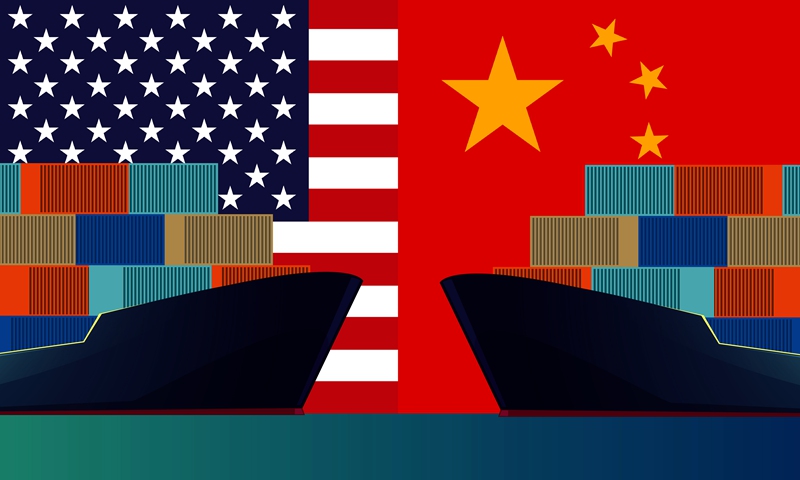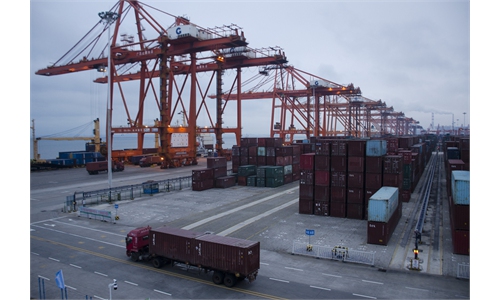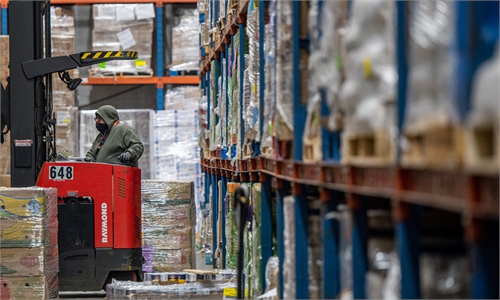US politicized tariff show indicates US economy is going downhill, won’t affect China: experts

China US Photo:Global Times
As the Biden administration announced on Friday it will keep tariffs on hundreds of billions of dollars of Chinese imports in place during a statutory review of the duties, it seems like there is little chance Washington will correct its mistake on the China tariff issue in the short term.
Chinese experts said on Saturday that the US has been sending ambiguous and sometimes contradictory signals on the China tariff issue in recent months, a typical demonstration of a heavily politicized economy that actually sees the trade issue as a bargaining chip.
The US Trade Representative's (USTR) office said since it had received requests from companies and other interested parties to maintain the "Section 301" tariffs imposed by former president Donald Trump, it will start a formal review of the tariffs, a process that could take months, Reuters reported on Saturday.
Based on the 1974 trade law under which the tariffs were imposed, after receiving requests for a continuation of the tariff policy ahead of their expiration in July from businesses benefiting from them, the USTR will keep the tariffs in place while conducting a review on whether to continue the tariff policy or not.
While what the USTR initiated is a statutory procedure, the Biden administration has the administrative power to lift the tariffs on Chinese imports. Senior US officials from President Joe Biden, to US Secretary of the Treasury Janet Yellen and Deputy National Security Advisor Daleep Singh all signaled in the first half of this year that they were considering lowering tariffs on Chinese imports due to the deflationary impact of tariff reductions, but the lack of real action is a clear indication that Washington has not considered the tariff issue from an economic perspective, but instead treating it as a "leverage" against China, experts noted.
For instance, following the mainland's military drills near the Taiwan island after US House Speaker Nancy Pelosi's provocative visit to the island, US media outlets quoted an anonymous source as saying that the Biden administration was rethinking potential tariff moves on Chinese products.
"Some US politicians such as US Trade Representative Katherine Tai openly called tariffs on Chinese goods as 'a significant piece of leverage' in the US-China trade relationship, showing that they want to show the 'toughness' over tariff issue against China amid the current poisoned political atmosphere while thinking about 'removing tariffs' in exchange for some concessions from China," Gao Lingyun, an expert at the Chinese Academy of Social Sciences in Beijing, told the Global Times on Saturday.
But imposing additional tariffs on Chinese products is a wrong move by the US in the first place, and it is ridiculous for the US to use it as a bargaining chip against China, Gao noted.
China's position on the tariff issue has always been consistent and clear. Lifting all the additional tariffs on China is good for both China and the US, and the world, Zhao Lijian, a spokesperson from the Ministry of Foreign Affairs, said at a press briefing in July.
"The industrial structure of the two countries is complementary. So if Washington wants to go against economic laws to distort the complementary structure with administrative power, it is doomed to fail in the long run," Gao said.
Despite the tariff scheme, China-US trade rose by 11.8 percent in yuan terms in the first seven months of this year, according to customs data. In 2021, bilateral trade soared by 28.7 percent. Over the past four years since the trade war started, China's foreign trade has set historical records.
It's noticeable that far from helping the US punish China, the tariffs have substantially raised the costs on American businesses and consumers. American consumers are bearing 92.4 percent of the costs of the tariffs applied to Chinese goods, according to a report published by Moody's Investors Service.
"US politicians choose to turn a blind eye to the damages that tariffs have done to the US economy, such as the high inflation, because they have yielded to the poisoned political atmosphere," He Weiwen, an executive council member of the China Society for World Trade Organization Studies, told the Global Times on Saturday.
Moreover, both the US domestic economic and foreign trade policies including the pursuit of "decoupling" from China and suppression of Chinese technological development by squeezing China out of the supply chain, all these moves are based on political considerations, not economic laws, which will backfire on its own economy, according to He.
"In fact, the intensified political interference in the economy further demonstrates the US economy is going downhill, because when the economy goes uphill, there won't be so much unnecessary political maneuvers," He noted.


